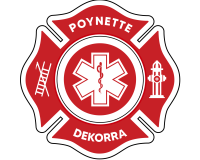Burning and Burn Permits
Obtaining a burning permit is the first step to safe burning. Fire conditions change quickly, so check the fire restrictions daily to find out if burning is allowed, burning hours, and/or any size limitations.
- Prior to burning, call the DNR hotline or visit the DNR website to check the daily burning restrictions at 1-888-wis-burn (947-2876) or dnr.wi.gov keyword “FIRE”
- Only burn clean untreated wood, clean “non-recyclable” paper products and vegetation. Consider other means of disposal such as composting or recycling
- DO NOT burn garbage or anything that is recyclable! This includes, but not limited to: plastic, shingles, wire, metal electronics, asphalt, painted or treated wood, rubber or oily substances, or structures of any kind (barns, sheds, homes, etc.)
- Attend your burn at all times and make certain it is completely extinguished and cold to the touch before leaving
- Comply with local ordinances, which may be more restrictive than state law
- DO NOT burn waste generated by a business or commercial entity
AS A REMINDER: If your burn escapes your control, dial 911 immediately. This is important as forest/wild fires can result in death or cause great bodily harm.
Safe Burning Tips
Debris burning is the number one cause of wildfires in Wisconsin. Using fire as a method to dispose of vegetative yard waste isn’t the only option. While debris burning is legal in most places, let’s face it… it’s unsafe, unhealthy, and a nuisance. If you choose to burn, follow these simple guidelines to ensure you are burning SAFELY:
Before Burning
- Find alternatives to burning debris before deciding to burn
- Obtain proper burn permits and follow any restrictions
- Comply with local ordinances that may be more restrictive than state law
- Make certain you are only burning legal materials
- Keep an eye on the weather and avoid burning under windy conditions
- Make certain the area adjacent to the burn is free of all flammables
- Special permits for burning beyond the maximum size limit or outside designated burning hours and permits sought by commercial contractors need to be issued by the local DNR Ranger Station
During Burning
- Have a water source and firefighting tools handy
- Keep the size of the burn small and manageable
- Maintain a mineral soil firebreak around the burn area
- Never leave your burn unattended
- If weather conditions change for the worst, put the fire out
- If your burn escapes, dial 911 immediately!
After Burning
- Make sure the burn is completely out before leaving
- Use lots of water, drown, stir and repeat until the fire is cold to the touch
- Go back and check again later for any remaining smoke or embers in roots and stumps


